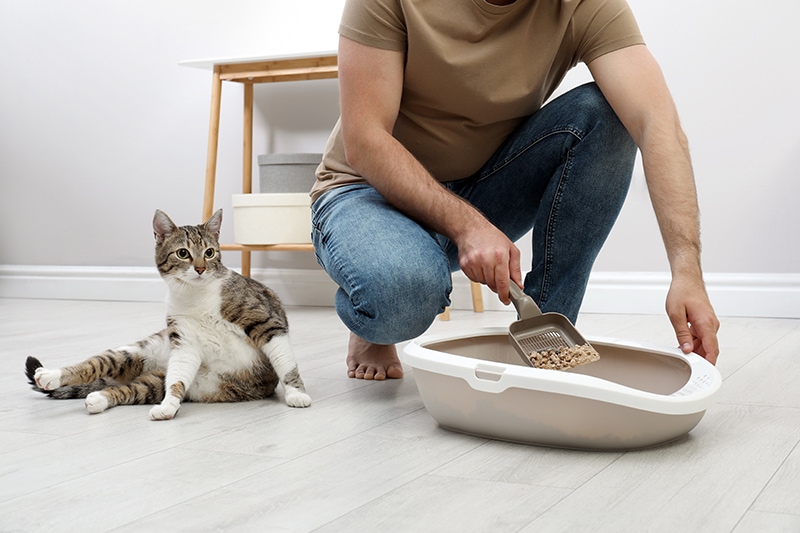
Incense is a great way to keep a pleasant smell inside your house. Pet accidents, stagnant air, and other unpleasant smells from garbage can easily be eliminated by using incense. Some people may even find the use of incense soothing, especially after a long day of work.
Cat owners surely have their fair share of strong odors, especially when it comes to the litter box. While the scent of incense may be relaxing for us humans, it can actually be bad and unpleasant for cats.
In this article, we explore just how harmful incense can be to cats, steps you can take to keep your house smelling clean and fresh, as well as safe alternatives you can use at home!
What is Incense?
Incense has been around for hundreds of years. Incense is typically shaped like a cone, block, or stick that is made out of natural plant materials and various essential oils. The incense is burned on one end that releases a rich, fragrant smoke as the stick slowly burns. Throughout history, incense has been used for solemnities, such as ceremonies, religious gatherings, and even meditation. Some cultures also consider incense as a repellent for evil spirits.
Today, incense is still used for solemn purposes, but is also popular for personal everyday use. The scent produced by the smoke is often pleasant and contains the ability to deter any unpleasant smell in a certain environment. On top of their pleasant smell, burning incense is also said to help reduce stress and anxiety.
How Is Incense Bad for Cats?
To manage the smell from a kitty litter box along with all other potential household smells that can be unpleasant, cat owners may consider using incense to freshen up their house.
Incense can be bad for your cat, but what about it is bad for them? And why should it be avoided by cat owners?

Sensitivity to Strong Smells
Incense smoke releases a strong, fragrant scent that even some people may find overwhelming. Cats, however, have a sense of smell that’s roughly up to 14 times stronger than humans. The aromatic smoke released by the incense can be too much for a cat’s 200 million smell receptors.
This overwhelming scent may cause your cat to be anxious. Some signs that your cat is stressed may include:
Risk of Respiratory Issues from Smoke
Aside from overwhelming your cat with its strong scent, incense smoke can put your cat at risk for respiratory and breathing issues. The smoke from incense is a potential irritant that can affect your cat’s respiratory tract, which causes coughing and allergic reactions.
Its smoke is also especially dangerous for cats with asthma or other respiratory problems. Any type of smoke or strongly scented product should be avoided around cats that suffer from lung problems.
Fire Hazard and Risk of Burns
Incense is essentially an unattended fire, which is considered a fire hazard to begin with. Cats are naturally curious animals and may find the sights of burning incense and shapely smoke attractive. If a cat gets too close, they may accidentally burn themselves, or worse, cause a fire by knocking down the incense.
Watch out for any signs of burns your cat may have on their body. Immediate first aid is recommended to treat burns and help the healing process.
How Else Can I Keep My House Smelling Good?
Just because incense is bad for our feline friends doesn’t mean cat owners can’t enjoy a clean and fresh-smelling house. Here are a few things cat owners can do to manage unwanted smells, as well as safe alternatives to incense!

Good Things to Practice!
The best way to manage unpleasant smells is to prevent them in the first place. Keeping your cat’s litter box and their immediate area clean at all times can greatly reduce the chances of unwanted smells in your home.
Aside from regular cleaning, dusting is also a good practice to keep the smell at bay. By regularly dusting your house, you are also managing the littlest of factors, such as pet dander, pollen, dead skin, and dirt. A dusty home can affect the air quality in your home, so preventing dust from accumulating is also a great way to keep your house smelling fresh.
To maintain good air quality inside the house, be sure to allot time for ventilation in your home. Setting a few hours to leave some windows open can allow the air in your home to circulate, preventing any stagnant indoor air from developing unwanted odors. This is also a great way to let some fresh air into your home!
Alternatives to Incense
Luckily for cat owners, there are cat-safe alternatives to freshen up your house’s smell. Febreze may have a bad reputation among cat owners, but the ASPCA reports that with proper use and handling, its use is safe for household pets. Just make sure that the areas sprayed with Febreze are properly dried before letting your pets enter.
Air Purifiers are also a great way to keep the quality in the air clean. It may not add any pleasant smells, but will essentially remove the bad odors by cleaning and sanitizing the air.
Baking soda is also a readily available solution with the ability to absorb odors. To prepare baking soda, try keeping it in a jar with a perforated lid to allow the baking soda to work its magic!
Other options you can explore include pet-friendly scented candles and DIY kitchen scents. Just make sure that the smells emitted are tolerated by your cat. Be sure to keep them out of reach, as well to avoid any breakages to keep your cat safe from injury.

What Are Some Other Scents to Avoid?
Aside from incense, there are other scents to avoid for households with cats. Just like incense, scented candles can have a similar effect on cats—on account of their strong smell and risk for respiratory issues due to the smoke.
Air fresheners may be less irritating for cats but can still trigger some sensitivities. They are much safer than the smoke-emitting incense and candles, but the smell can still potentially overwhelm your cat. Before routinely using air fresheners, be sure to observe how your cat responds to it first. If you observe any negative behaviors or signs of stress, it would be best to avoid air fresheners entirely.
Essential oils and oil diffusers are a great way to keep your house fragrant and pleasant. Unfortunately, they have the potential to cause or exacerbate respiratory issues in your cat. Not only can they affect your cat’s respiratory system, some essential oils are toxic to cats and may cause more serious liver and respiratory damage, seizures, and potentially death.
Essential oils to avoid include the following:
Some cat owners may still need to use incense for cultural or religious purposes. If incense is unavoidable in the household, here are certain steps that cat parents can take to keep their cats safe.
Final Thoughts
Incense is a pleasant way to relax and reduce stress while keeping the house aromatic and fragrant. While enjoyable for humans, they can make cats uncomfortable and potentially harm them. Luckily, cat owners have alternatives to keep their house smelling fresh and clean.
When owning a cat, managing unpleasant smells is part of the experience. Cats are sensitive animals, so be sure to keep them in mind when figuring out ways to keep your house smelling pleasant!
Featured Image Credit: Marisol Araujo_Shutterstock







